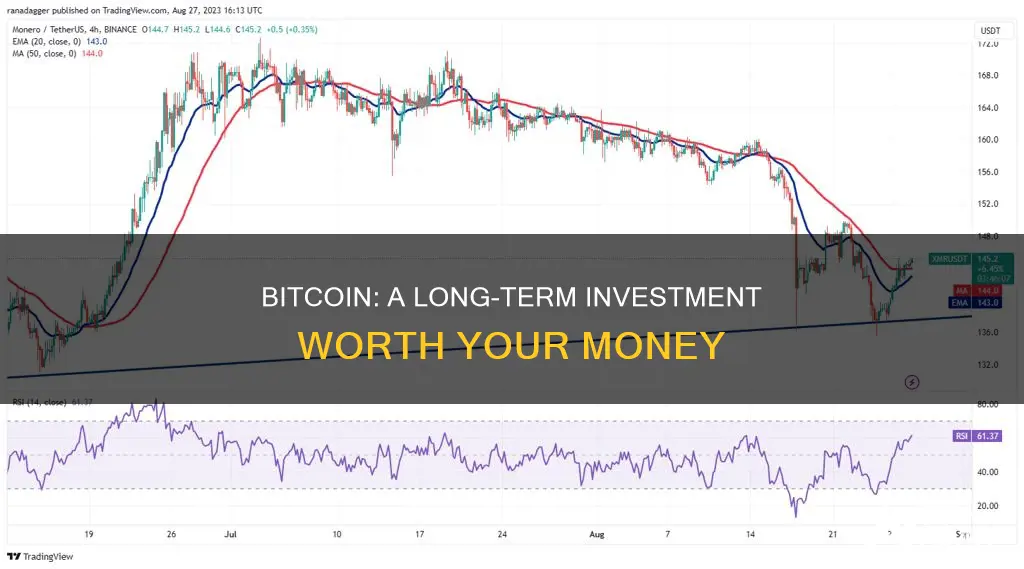
Bitcoin is a highly volatile investment option that has produced eye-popping returns for some and significant losses for others. It is a risky investment that is generally recommended only for those with a high-risk tolerance, strong financial position, and capacity to absorb potential losses.
Bitcoin's value is based on speculation and influenced by factors such as market demand, inflation, and regulatory changes. It is a decentralised digital currency built on blockchain technology, which enables secure peer-to-peer transactions without the need for intermediaries like banks.
Some experts believe that Bitcoin will appreciate in value over time due to its limited supply and increasing demand, particularly from younger investors. They argue that Bitcoin could become a global reserve currency, serving as a neutral alternative to national currencies and a means of payment in international trade.
However, others remain sceptical due to its volatility, regulatory risks, and the potential for fraud. It is important for investors to carefully consider their risk tolerance, conduct thorough research, and diversify their portfolios when investing in Bitcoin or any other cryptocurrency.
| Characteristics | Values |
|---|---|
| Decentralized | Bitcoin is decentralized, but many people choose to trade and store it on centralized platforms. |
| Non-correlated asset | Bitcoin has the potential to be a non-correlated asset, similar to gold. |
| Volatile | Bitcoin is incredibly volatile and can have huge swings in price in the blink of an eye. |
| High returns | Bitcoin has historically offered the potential for high returns. |
| Limited supply | There is a finite amount of Bitcoin, with a fixed supply of 21 million units. |
| Store of value | Bitcoin represents a store of value similar to gold. |
| Payment method | Bitcoin can be used as a means of payment, making it useful for large cross-border payments. |
| Regulatory risks | Crypto laws and regulations vary from country to country. Some countries have banned it, while others are looking for ways to regulate it. |
What You'll Learn
- Bitcoin's value is expected to increase due to its demand as a global reserve currency
- Bitcoin is a decentralised, secure digital currency
- Bitcoin's value is independent of other assets, like stocks
- Bitcoin is a good long-term investment if you can afford to lose your investment
- Bitcoin has the potential to become the first truly global currency

Bitcoin's value is expected to increase due to its demand as a global reserve currency
Bitcoin's value is expected to increase due to its demand as a potential global reserve currency. A global reserve currency is held by governments, central banks, and international organizations as part of their foreign exchange reserves. It serves as a store of value and a medium of exchange for international transactions, facilitating international trade, promoting financial stability, and providing liquidity in times of crisis.
Bitcoin has unique attributes that make it a potential candidate for a global reserve currency. Its decentralized nature, operating on a blockchain network, ensures transparency, security, and protection against fraudulent activities. Its consensus mechanism and limited supply of 21 million coins create an environment where Bitcoin can act as a reliable store of value, similar to gold. Bitcoin's global accessibility offers anyone with an internet connection the ability to use it, facilitating cross-border transactions without the limitations and fees of traditional banking systems.
Adopting Bitcoin as a global reserve currency could provide several benefits. It could reduce currency risks by diversifying away from a single fiat currency, as Bitcoin's value is not tied to any specific government or central bank. Bitcoin's blockchain technology enables fast and low-cost international transactions, fostering economic growth and simplifying international settlements. Additionally, Bitcoin's accessibility could empower the unbanked population, particularly in developing nations, by providing access to financial services, stimulating economic growth, and promoting financial stability.
However, there are challenges to Bitcoin becoming a global reserve currency. Its high volatility poses risks for long-term financial planning and stability. The regulatory landscape surrounding Bitcoin is still evolving, and establishing consumer protection, anti-money laundering measures, and achieving regulatory compliance are essential for its widespread acceptance. Additionally, Bitcoin's network faces scalability challenges, with limited transaction capacity and longer confirmation times during high-demand periods.
Bitcoin Investment: Right Time to Buy?
You may want to see also

Bitcoin is a decentralised, secure digital currency
Bitcoin is decentralised in the sense that it is not issued by any central authority, like a government or bank, and transactions are verified by a network of computers. This makes it theoretically immune to government interference or manipulation. Bitcoin transactions are secured by blockchain technology, which is a digital ledger of transactions. Each transaction is given a unique digital signature, which is then verified by the network of computers. This makes it nearly impossible to counterfeit or double-spend Bitcoins.
The decentralised nature of Bitcoin has led to the emergence of several centralised services that take up a large share of the Bitcoin market, such as mining pools and web wallets. These services can be convenient for users, but they also come with risks, such as the possibility of hacking or losing access to your Bitcoins.
While Bitcoin is a decentralised and secure digital currency, it is important to note that it is also a highly volatile and risky investment. The price of Bitcoin can fluctuate significantly, and there is no guarantee that it will increase in value over time.
Blockchain's Future: A Wise Investment Decision?
You may want to see also

Bitcoin's value is independent of other assets, like stocks
Bitcoin's value is derived from its decentralised nature, which is underpinned by blockchain technology. Blockchain enables secure peer-to-peer digital payments that do not require a third party, like a bank, to verify them. This means that Bitcoin is not influenced by the same factors as traditional stocks and shares, and its value is independent of other assets.
Bitcoin's value is determined by its restricted supply and increasing demand. There will only ever be 21 million bitcoins in existence, and as the supply of unrewarded coins diminishes, demand increases. This is in contrast to stocks, which are influenced by company performance and wider economic factors.
Bitcoin is also not influenced by the same factors as commodities, which are impacted by their raw material inputs and production processes. Bitcoin's value is derived from its decentralised nature and the increasing demand for digital currencies.
Additionally, Bitcoin is not tied to the value of any one national currency, like the US dollar or the Japanese yen, which are influenced by central bankers and government policies. Instead, Bitcoin's value is derived from its position as a global currency, accepted and used by people all over the world.
Bitcoin's value, therefore, is independent of other assets, and this makes it an attractive investment for those looking to diversify their portfolios and reduce their exposure to traditional stocks and shares. However, it is important to note that Bitcoin is a highly volatile asset, and its value can fluctuate significantly.
Shipwreck Coins: Worthy Investment or Risky Business?
You may want to see also

Bitcoin is a good long-term investment if you can afford to lose your investment
First, Bitcoin has historically offered the potential for substantial returns. The value of Bitcoin has increased significantly over the years, and it is the most popular and largest cryptocurrency by market capitalization. Its decentralized nature, based on blockchain technology, eliminates the need for third-party verification, making it a secure peer-to-peer payment system.
Second, Bitcoin has a fixed supply of 21 million units, unlike fiat currencies such as the US dollar, which can be printed at the discretion of central bankers. This limited supply makes Bitcoin a deflationary asset, which may appreciate in value over time as demand increases. Additionally, Bitcoin's decentralized nature makes it a borderless and neutral alternative to national currencies, potentially positioning it as a global reserve currency.
Third, the increasing adoption of Bitcoin by large companies and digital payment platforms, such as PayPal and Square, indicates its growing acceptance as a means of payment. This increased demand can drive up the price of Bitcoin over the long term.
Lastly, the unique properties of Bitcoin, such as its decentralized nature, limited supply, and ability to facilitate cross-border transactions, make it an attractive investment for those seeking to diversify their portfolios. However, it is crucial to remember that the cryptocurrency market is highly speculative, and there are no guarantees of future performance.
In conclusion, while Bitcoin may be a good long-term investment, it is essential to approach it with caution and only invest what you can afford to lose. It is always recommended to consult with a financial advisor before making any investment decisions.
Doge Coin Stock Investment: A Beginner's Guide
You may want to see also

Bitcoin has the potential to become the first truly global currency
Bitcoin is a risky investment with high volatility, but it has the potential to become the first truly global currency. Here's why:
Firstly, Bitcoin is a decentralized, secure digital currency based on blockchain technology. Blockchain enables secure peer-to-peer digital payments without the need for a third party, like a bank, to verify them. This makes it a trustless alternative to traditional currencies, as the value of Bitcoin is intrinsic to the currency itself rather than being a claim on any counterparty.
Secondly, Bitcoin has a finite supply of 21 million units, unlike many major global currencies such as the US dollar. This fixed supply means that Bitcoin can serve as a hedge against inflation, as its value is not dependent on central bankers' decisions. As inflation eats away at the value of traditional currencies, investors may turn to Bitcoin as a liquid, non-inflationary asset.
Thirdly, Bitcoin is traded globally and can be exchanged for any currency. Its decentralized nature means that it can serve as a neutral alternative to national currencies in international trade. For example, if an exporter only accepts yuan but the buyer only has dollars, they can easily exchange dollars for Bitcoin and then Bitcoin for yuan, without the need for a trusted intermediary.
Finally, the increasing pace of Bitcoin adoption is a sign of a maturing industry. More companies are accepting Bitcoin as a form of payment, and financial giants are making it easier to buy and sell cryptocurrency on their platforms. This indicates that Bitcoin is being considered safe enough for investing large sums of money, and its use as a means of payment further contributes to its potential to become a global currency.
In conclusion, while Bitcoin is a volatile and risky investment, its unique characteristics as a decentralized, finite, and global currency give it the potential to become the first truly global currency.
Strong Coin Investment: Worthwhile or Worthless?
You may want to see also
Frequently asked questions
Bitcoin is a good long-term investment because it is a global reserve currency that is decentralised and secure. It is also a neutral alternative to national currencies, which makes it seizure-resistant.
Bitcoin is a risky investment due to its volatility and unproven rate of return. It is also vulnerable to hacking and fraud.
Bitcoin has the potential to be a non-correlated asset, similar to gold. It also has a finite supply, which is unlike many major global currencies.
Bitcoin is incredibly volatile and its value is uncertain. It is also difficult to scale a public blockchain, and as mining becomes more difficult, the amount of computing power needed increases.







